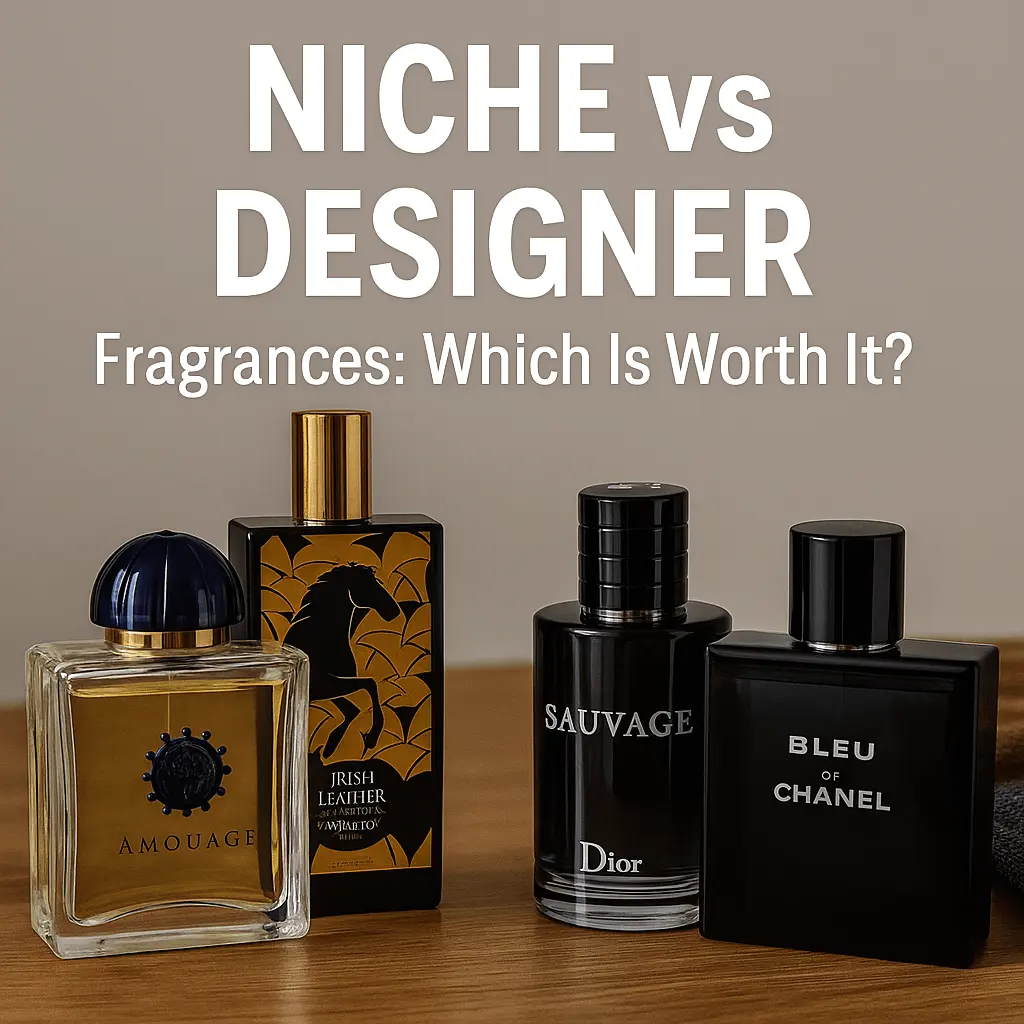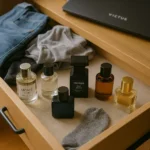When I first started exploring fragrances, I had no idea what terms like “niche” or “designer” even meant. I just wanted to smell good, like everyone else. Fast forward a few years, dozens of perfume samples later, and even experimenting with creating my own fragrances, I finally understand what sets these categories apart. So, if you’re wondering about niche versus designer fragrances, let me share my personal journey and help you make the most informed purchase for yourself.
What are Designer Fragrances?
Most of my fragrance collection is built around designer fragrances. Why? Because they’re accessible, affordable, and typically very versatile. Designer fragrances are usually created by fashion brands like Dior, Chanel, Gucci, Versace, and Prada. They aim to appeal to a wide range of people, offering universally liked scents.
Take Dior Sauvage, for example—it’s incredibly popular because it smells fantastic, projects strongly, and lasts a long time. It’s reliable, familiar, and honestly, you can’t go wrong with it. Designer fragrances are also widely available in department stores, duty-free shops, and online, making them very convenient.
If you’re curious about classics like the ones I just mentioned, check out my article on best summer fragrances for men. 🙂
What are Niche Fragrances?
But there comes a point in every fragrance lover’s life where curiosity pushes you toward something different. That’s when niche fragrances enter the scene. Unlike designer fragrances, niche perfumes are produced by brands that specialize exclusively in fragrances, focusing on craftsmanship, innovation, and creativity.
My first niche fragrance was MOME Paris – Irish Leather. I loved it because it felt special, unique—almost like it was tailor-made just for me. I’ve also explored houses like Mancera, Xerjoff, Creed, Amouage, Le Labo, and Byredo, all of which showcased fragrance notes and ingredients I’d never experienced before. (If you want to dive deeper into niche scents, my review of Lattafa Khamrah gives another perspective on a fragrance with niche-like qualities.)
Ingredients and Creativity: Niche vs Designer
One of the most significant differences between niche and designer fragrances lies in their ingredients and creative freedom. Niche fragrances often incorporate rare, high-quality, and sometimes unconventional ingredients. Think of oud, leather, saffron, or even unusual notes like smoke or animalic accords.
Designer fragrances tend to use familiar, crowd-pleasing notes like citrus, vanilla, musk, and floral accords. They’re carefully formulated to appeal broadly, whereas niche fragrances celebrate bold experimentation and artistic expression.
💡For more tips on understanding ingredients and storage, you might like my guide on how to store perfume correctly.
Performance: Longevity and Projection
There’s a common perception that niche fragrances outperform designer fragrances regarding longevity and projection. From my experience, niche fragrances typically do excel in this area, largely due to their concentration of premium ingredients.
However, it’s not always clear-cut. Designer fragrances like Dior Sauvage or Chanel Bleu offer excellent performance and often match or even surpass some niche scents. Another notable example is Tom Ford, which, to me, sits between niche and designer categories, offering niche-quality performance with broader market appeal.
Pricing: Are Niche Fragrances Worth It?
Price is often the biggest differentiator. Niche fragrances can cost significantly more due to their premium ingredients, smaller production batches, and meticulous craftsmanship. Is it worth the extra investment? It depends on your personal priorities. If uniqueness, complexity, and exclusivity matter to you, niche fragrances might justify their higher price tag.
Designer fragrances, meanwhile, offer great value, versatility, and reliable performance at a more accessible price point. They’re perfect if you prefer something easy to wear daily and universally appealing.
When to choose each
Go for designer if:
- You want something reliable and crowd-pleasing
- You’re building a starter fragrance wardrobe
- You prefer moderate prices and availability
Go for niche if:
- You want to stand out or explore olfactory art
- You already own the basics and want something more complex
- You’re okay with spending more for a personal signature scent
Final thoughts: there’s no wrong choice
Fragrance is deeply personal. What smells incredible to one person might feel overwhelming to another. Whether you choose designer or niche, what matters most is how the fragrance makes you feel.
My advice? Try both. Explore. Blind buy a designer fragrance if you’re new, and once your nose matures, dip your toes into the niche world. You might just find something unforgettable.
Frequently Asked Questions (Q&A)
Q1: Are niche fragrances worth the high price?
A: It depends on what you value. If uniqueness, quality ingredients, and artistry matter to you, yes. But don’t overlook great designer options.
Q2: Why are niche perfumes more expensive?
A: They often use rare materials, small-batch production, and lack the mass-market economies of scale that designer brands benefit from.
Q3: Can designer fragrances smell just as good?
A: Absolutely. Many designer scents are beautifully crafted and compliment magnets. It’s not always about cost — it’s about composition and taste.
Q4: Where can I buy niche fragrances?
A: Specialty boutiques, niche-focused online stores, or directly from the brand. Sampling first is always a good idea.
Q5: What if I want the best of both worlds?
A: Some brands (like Tom Ford or Maison Margiela) blur the line between niche and designer. You don’t have to choose one side — mix and match to fit your lifestyle.

